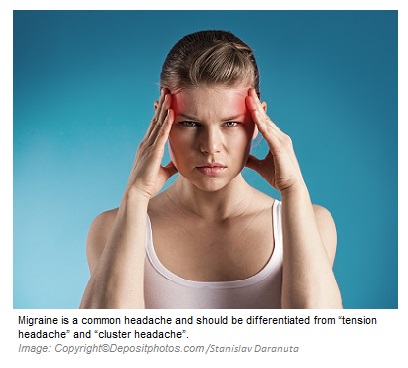 It is a periodic headache associated with neurological, gastrointestinal, and autonomic symptoms. The headache is typically pounding, one-sided, and along with loss of appetite, nausea and vomiting. Migraine occurs mainly at late teenage years and early adulthood.
It is a periodic headache associated with neurological, gastrointestinal, and autonomic symptoms. The headache is typically pounding, one-sided, and along with loss of appetite, nausea and vomiting. Migraine occurs mainly at late teenage years and early adulthood.
Some people may experience some neurological symptoms prior to headaches which is called “aura”. The person with migraine may complain of photophobia (increased sensitivity to light), phonophobia (increased sensitivity to sound) and osmophobia (increased sensitivity to odor).
It is believed that migraine occurs due to constriction followed by dilatation of the blood vessels in the head.
Potential triggering factors:
- Genetics.
- Emotional stress.
- Food allergies. According to few studies, the foods that most frequently trigger symptoms of migraine were wheat, orange, egg, peanuts, tea and coffee, chocolate, cow`s milk, beef, corn, tomato, cane sugar, yeast, mushrooms, and peas.
- Excessive sodium intake.
- Weather changes. Storms, changes in altitude, and gloomy weather might initiate migraine episode.
- Lack of sleep.
- Fatigue.
- Skipping meals. It leads to low blood sugar level, which may trigger migraine.
- Menstruation.
- Hormonal changes.
- Excessive caffeine consumption or withdrawal from caffeine could trigger migraine headaches.
- Mitral valve prolapse (MVP). It has been linked to migraine.
- Nutritional deficiencies (especially magnesium, calcium, vitamins B2 and B6).
- Low levels of serotonin.
- Foods additives (MSG, aspartame, and nitrates).
- Medications (sublingual nitroglycerin, and Isordil).
- Intense physical exertions.
Nutritional Supports:
Restricted Foods:
- Foods high in “tyramine”: aged cheese, yogurt, smoked, cured or prickled meat or fish, red wine, and soy products (tofu, miso, and tempeh).
- Foods high in “phenylethylamine”: citrus fruits, red wine, cocoa, chocolate, yellow cheese, and cheesecake.
- Foods high in “phenylalanine”: beef, pork, fish, poultry, egg, yogurt, cheese, soy products, chickpeas, lentils, peanut butter, and walnuts.
- Foods high in “histamine”: bananas, beef, beer, citrus fruits, pineapple, eggplant, tomato, tomato sauce, tomato paste, tofu, miso, tempeh, tamari, fish and yellow cheeses.
- Processed meats.
- Cold cuts.
- Hot dogs.
- Soft drinks.
- Aspartame and any aspartame – containing beverages and foods.
- Foods that contain monosodium glutamate (MSG), sodium caseinate, and hydrolyzed proteins: commercial soups, soy sauce, and salad dressings.
- Excessive intake of salt.
- Salty snacks and foods.
Recommended Foods:
- Drinking plenty of water: least 2 liters a day. Dehydration may trigger migraine headaches.
- Foods high in fiber.
- Flaxseeds.
- Fresh fruits and vegetables, except the ones that have been discovered as triggering agents.
- Fruits high in flavonoids: berries.
- Cayenne pepper.
- Foods with anti-platelet activities: ginger, garlic, and onions. One of the theories about migraine is an increased tendency to platelet aggregation.
Recommended Supplements:
- Magnesium: 200 – 400 mg a day. This mineral promotes relaxation and comfort in both migraine and tension headaches. It is especially effective in preventing migraine. Also it has been shown that magnesium may prevent migraine by preventing MVP (mitral valve prolapse).
- Co – Enzyme Q10: 300 mg a day. It is a powerful antioxidant and very helpful in decreasing the frequencies of migraine.
- 5 – HTP (5 – hydroxytryptophan): 50 – 100 mg a day. This amino acid is effective in alleviating migraine by increasing serotonin levels.
- Vitamin B2 (Riboflavin): 400 mg a day. This vitamin is effective in preventing migraine.
- Feverfew: 250 – 500 mcg a day. The active ingredient in feverfew is “parthenolide”, which prevents platelet aggregation and inhibits the release of inflammatory mediators, leading to a decrease in the severity and frequency of migraine.
- French Maritime Pine Bark Extract: 100 – 200 mg a day. It is a powerful antioxidant with ability to improve microcirculation. It is effective in preventing migraine.
- Grape Seed Extract: 50 -100 mg a day. It contains bioflavonoids that help preventing migraine.
- Omega – 3 Fatty Acids: 1 – 3 grams a day. Omega – 3 fatty acids have been shown to decrease frequency, duration, and severity of migraine.
- Vitamin B6: 50 – 100 mg a day. This vitamin is important in the production of serotonin and the breakdown of histamine. Hence, vitamin B6 deficiency may trigger migraine attacks.
- Ginkgo Biloba: 120 – 240 mg a day. It inhibits platelet aggregation followed by decreasing the incidence of migraine attacks.
Miscellaneous Suggestions:
- Maintaining a balanced blood sugar level by frequently eating foods high in fiber and low in glycemic index.
- Liver detoxification.
- Colon cleansing.
- Acupuncture.
- Massage of the neck and upper back.
- Meditation.
- Yoga.

